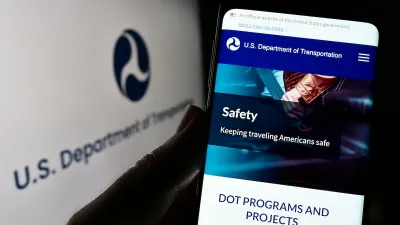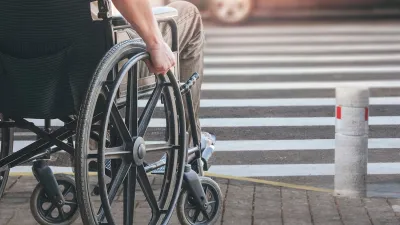Research into accessibility, transit equity, and traffic safety is losing federal funding at an alarming rate.

In a piece for Streetsblog USA, Kea Wilson outlines the sustainable transportation research programs caught in the crosshairs of the Trump administration’s fight against what they term DEI, projects that affect everything from road safety to transit equity and accessibility.
Advocates are still attempting to measure the full scope of the purge, but Nature recently reported that at the National Science Foundation alone — a $10-billion grant-making agency that is among the leading funders of science and engineering research in the country — ‘around 10,000 research grants have been flagged for review’ for possible violations of the executive orders, based in part on searches for broadly-used keywords that frequently arise in papers about the U.S. transportation system.
Nick Ferenchak, director of the US DOT-funded Center for Pedestrian and Bicyclist Safety, emphasized the center’s focus on pedestrian safety and said none of their programs have been affected. While “there might be some revised language in the future, … we should continue [our existing projects] as normal for now.”
Wilson explains why equity efforts matter in transportation policy. For example, “People in wheelchairs have at least a 36 percent higher probability to be killed in traffic collisions than people without disabilities, though federally collected data on disability is already so poor that some experts suspect the ratio is far higher.” Making research on these topics itself dangerous will limit efforts to make roads safer for all users. Now, scientists in a variety of disciplines are in a holding pattern, unsure of the future of their projects.
FULL STORY: Sustainable Transportation Research Is Snagged In Trump’s Anti-‘DEI’ Dragnet

Maui's Vacation Rental Debate Turns Ugly
Verbal attacks, misinformation campaigns and fistfights plague a high-stakes debate to convert thousands of vacation rentals into long-term housing.

Planetizen Federal Action Tracker
A weekly monitor of how Trump’s orders and actions are impacting planners and planning in America.

San Francisco Suspends Traffic Calming Amidst Record Deaths
Citing “a challenging fiscal landscape,” the city will cease the program on the heels of 42 traffic deaths, including 24 pedestrians.

Defunct Pittsburgh Power Plant to Become Residential Tower
A decommissioned steam heat plant will be redeveloped into almost 100 affordable housing units.

Trump Prompts Restructuring of Transportation Research Board in “Unprecedented Overreach”
The TRB has eliminated more than half of its committees including those focused on climate, equity, and cities.

Amtrak Rolls Out New Orleans to Alabama “Mardi Gras” Train
The new service will operate morning and evening departures between Mobile and New Orleans.
Urban Design for Planners 1: Software Tools
This six-course series explores essential urban design concepts using open source software and equips planners with the tools they need to participate fully in the urban design process.
Planning for Universal Design
Learn the tools for implementing Universal Design in planning regulations.
Heyer Gruel & Associates PA
JM Goldson LLC
Custer County Colorado
City of Camden Redevelopment Agency
City of Astoria
Transportation Research & Education Center (TREC) at Portland State University
Jefferson Parish Government
Camden Redevelopment Agency
City of Claremont





























